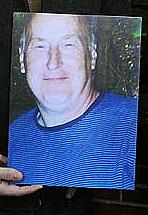Health on the Horizon: My Brother's Keeper- Billy Koehler's Story

 While walking down the street in the spring of late 1980's Billy found a senior citizen crying on her porch. When he approached her to find out why she was so upset, she explained, "my television is broken and it will cost $25 to fix." To many people this may not be a cause of such great sadness, but to a senior living alone on a fixed income, her only source of companionship was now gone.
While walking down the street in the spring of late 1980's Billy found a senior citizen crying on her porch. When he approached her to find out why she was so upset, she explained, "my television is broken and it will cost $25 to fix." To many people this may not be a cause of such great sadness, but to a senior living alone on a fixed income, her only source of companionship was now gone.
However, today was her lucky day. Billy, an electronics technician, had found her. He hurried home, got his tools and repaired the television. After he finished the repair, the woman sifted through her purse and offered him $5 for his service. Billy responded, "why would you give me $5 for 1 cent worth of work?" With gratitude, the woman handed Billy a penny. When asked by a friend later why he took the penny, Billy replied, "Even a poor senior needs to know that they can contribute."
A religious man, Billy's life echoed the teachings of Luke 20:45- the story of the poor widow that enters the temple amongst the wealthy elite to give her last 2 coins.
After the electronics company he worked for suddenly closed in the Spring of 2003, he was left uninsured with a heart condition that required him to have an Automatic Internal Cardiac Defibrillator (AICD). While looking for another job that had insurance, Billy spent the rest of his days building a ramp for a man in a wheelchair and refused any payment for his services.
Billy believed that he was was brother's keeper.
By 2005, Billy began delivering pizza's 31 hours a week for minimum wage with no health insurance. Due to his pre-existing condition, health insurance companies deemed him a bad investment and society stigmatized him the same. This stigma crystalized on December 14, 2007 after he collapsed while closing the pizza shop. Upon his arrival at the Emergency Room, a resident opened his chart and replied, "oh, you're uninsured. I need to tell you that you won't get the same tests as people that have insurance."
Are we our brother's keeper?
Hours later, the cardiologist on staff informed him of his dire condition. The battery that delivers the life-sustaining electronic charge to his heart was dangerously low and needed to be replaced immediately. The procedure would cost between $60-100,000. Unable to produce the money, Billy was discharged immediately and told by the cardiologist, "if you get your priorities straightened out, you'll come up with the money."
Are we our brother's keeper?
Unable to find $60,000, Billy and his family lived the next 446 days wondering if this was going to be his last. On Sunday March 6, 2009 Billy knelt before the alter of his church and asked his almighty healer to answer the will of his heart.
The answer came at 5:00pm the next day. On March 7, 2009 Billy left work, got behind the wheel of his car and headed home. Without the battery, the defibrillator was still capable of giving him the "warning signal" that an electronic jolt was needed. The signal came. Billy pulled over to the side of the road, knowing that the life-sustaining jolt would not be delivered, he sat and waited to meet his creator. At 5:07pm Billy was found dead over the steering wheel of his car.
This story was written with the help of Georgeann Koehler, Billy's sister. Georgeanne has become an outspoken activist about the issue of access to healthcare. In December of 2011, Georgeanne facilitated a postcard campaign entitled "No more empty chairs at the table" which produced 1200 cards in 12 days to every PA Congressman and Senator. Georgeanne has dedicated herself to being her brother's keeper.
Please return next week to learn more about the details of Billy's experience and see how the PPACA prevent more "Billy's".
Visit my weekly blog "Health on the Horizon" at: www.healthonthehorizon.blogspot.com
Follow "Health on the Horizon" on Facebook at: http://www.facebook.com/healthonthehorizon
"Health on the Horizon" is a weekly blog about my travels around the state of Pennsylvania looking at how the Patient Protection and Affordable Care Act will impact individuals, groups and institutions.

